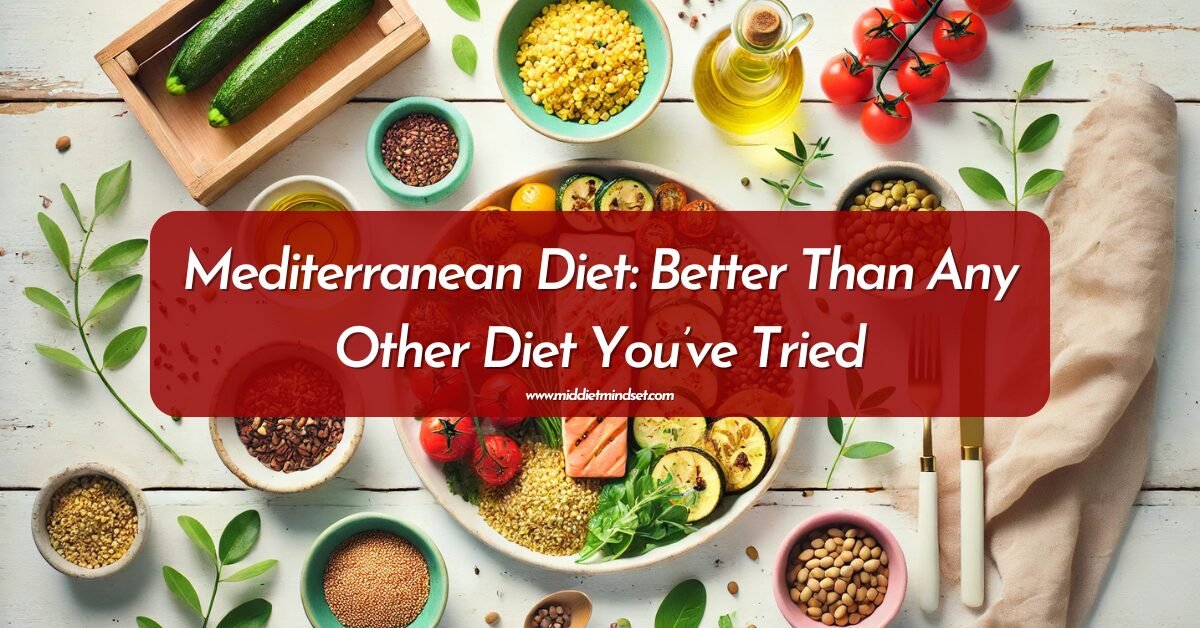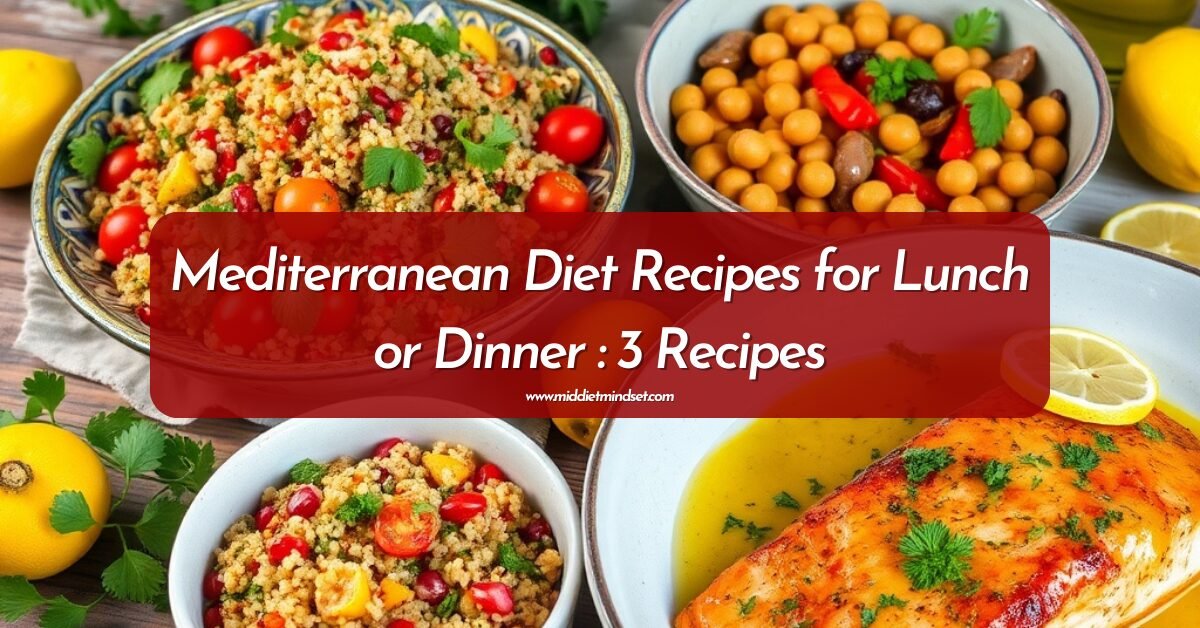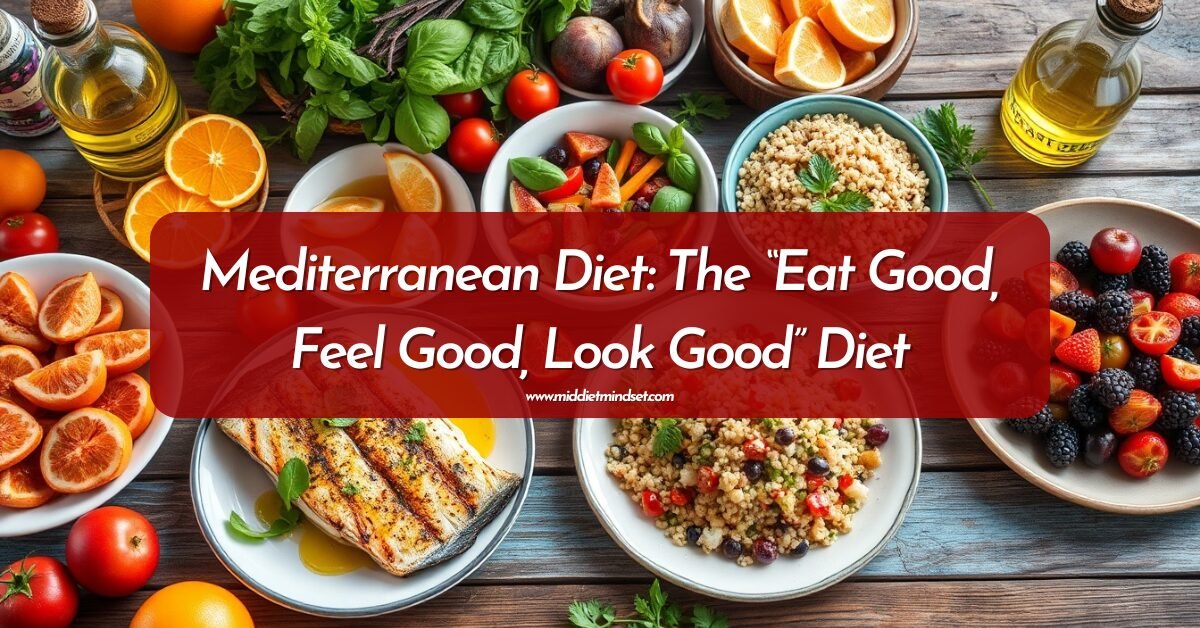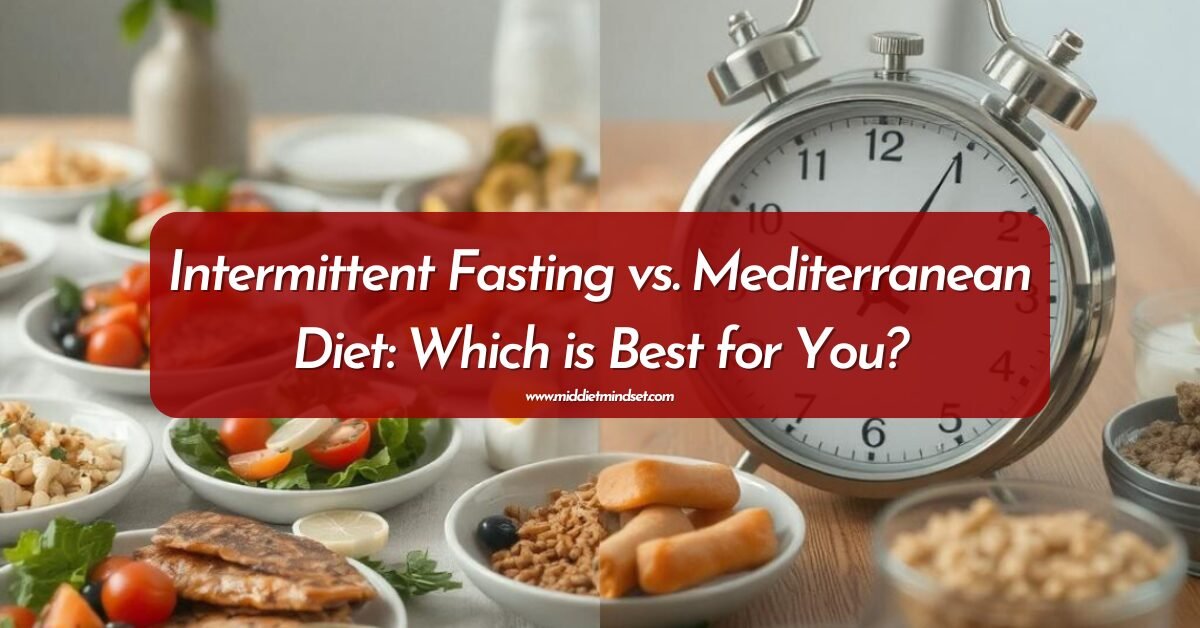Table of Contents
ToggleWhen it comes to sustainable weight management, most diets deliver short-term results that often fade quickly. The Mediterranean Diet for Weight Loss, however, stands out as a proven strategy that makes achieving and maintaining a healthy weight feel effortless and enjoyable. Unlike restrictive fad diets, this lifestyle focuses on whole, nutrient-dense foods that nourish both your body and mind.
The problem with many popular diets lies in their rigid and unrealistic rules. Whether it’s eliminating entire food groups, meticulously counting calories, or following strict meal schedules, these approaches often leave you feeling deprived and frustrated. Worse, they can negatively impact your long-term health. The Mediterranean Diet provides a refreshing, evidence-based alternative that’s flexible, delicious, and genuinely effective for weight loss.
By embracing the Mediterranean Diet for Weight Loss, you’re not just starting a new diet—you’re adopting a lifestyle rooted in science and tradition. This approach emphasizes balance and satisfaction, allowing you to enjoy your meals while gradually shedding excess weight. Think vibrant salads drizzled with olive oil, fresh fruits, hearty grains, and lean proteins that fuel your day without deprivation.
This article will guide you through the essentials of the Mediterranean Diet for Weight Loss, explaining why it’s unlike any other program you’ve encountered. You’ll discover how its health benefits extend beyond the scale, supporting heart health, brain function, and overall well-being. By the end, you’ll have actionable tips to start incorporating this powerful, weight-loss-friendly lifestyle into your daily routine.
If you’re ready to leave behind the cycle of yo-yo dieting and embrace a sustainable, nourishing path to weight loss, the Mediterranean Diet could be the solution you’ve been searching for.
Why the Mediterranean Diet Stands Out for Weight Loss
Balanced Nutrition Over Restriction
The Mediterranean Diet for Weight Loss thrives on abundance, not deprivation. Instead of banning entire food groups, it promotes a wide variety of nutrient-rich options, including vegetables, whole grains, legumes, lean proteins, and healthy fats. Unlike restrictive low-carb or ultra-low-calorie diets, this plan ensures you feel satisfied while naturally controlling calorie intake. For example, a vibrant quinoa tabbouleh with ripe tomatoes, fresh parsley, and a drizzle of olive oil offers a meal that’s as satisfying as it is nutritious. By embracing balance over restriction, this diet makes sustainable weight loss an achievable goal.
Scientifically Proven Success
Research shows that the Mediterranean Diet is a great choice for managing weight. A 2022 study found that people who stuck closely to this diet were 9% less likely to become overweight or obese. Plus, even small improvements in following the Mediterranean Diet could help prevent weight gain over time. With its focus on fiber-rich foods like fruits, veggies, and whole grains, along with healthy fats like olive oil and fish, this diet keeps you feeling full and satisfied. Best of all, it’s not about strict rules or quick fixes—it’s a simple, sustainable way to stay healthy and manage your weight.
Holistic Approach to Health
The Mediterranean Diet for Weight Loss isn’t solely about shedding pounds; it’s about enhancing overall health. Studies consistently show its benefits, such as reducing heart disease risk, improving brain function, and combating inflammation. These wide-ranging health advantages make the Mediterranean Diet a lifestyle shift rather than just a weight-loss method. By adopting this holistic approach, you not only achieve your weight loss goals but also invest in long-term well-being.

The Takeaway
◼The Mediterranean Diet emphasizes variety and abundance, allowing you to enjoy satisfying, nutrient-rich meals without eliminating entire food groups or drastically reducing calories.
◼Research shows that the Mediterranean Diet supports weight management by helping prevent weight gain and reducing the risk of obesity. Its high-fiber foods and healthy fats keep you feeling full and satisfied, making it a sustainable and enjoyable way to stay healthy.
◼Beyond weight loss, the Mediterranean Diet improves heart health, brain function, and inflammation, making it a comprehensive approach to both achieving and maintaining overall well-being.
Mediterranean Diet vs. Very Low Carbohydrate Diets
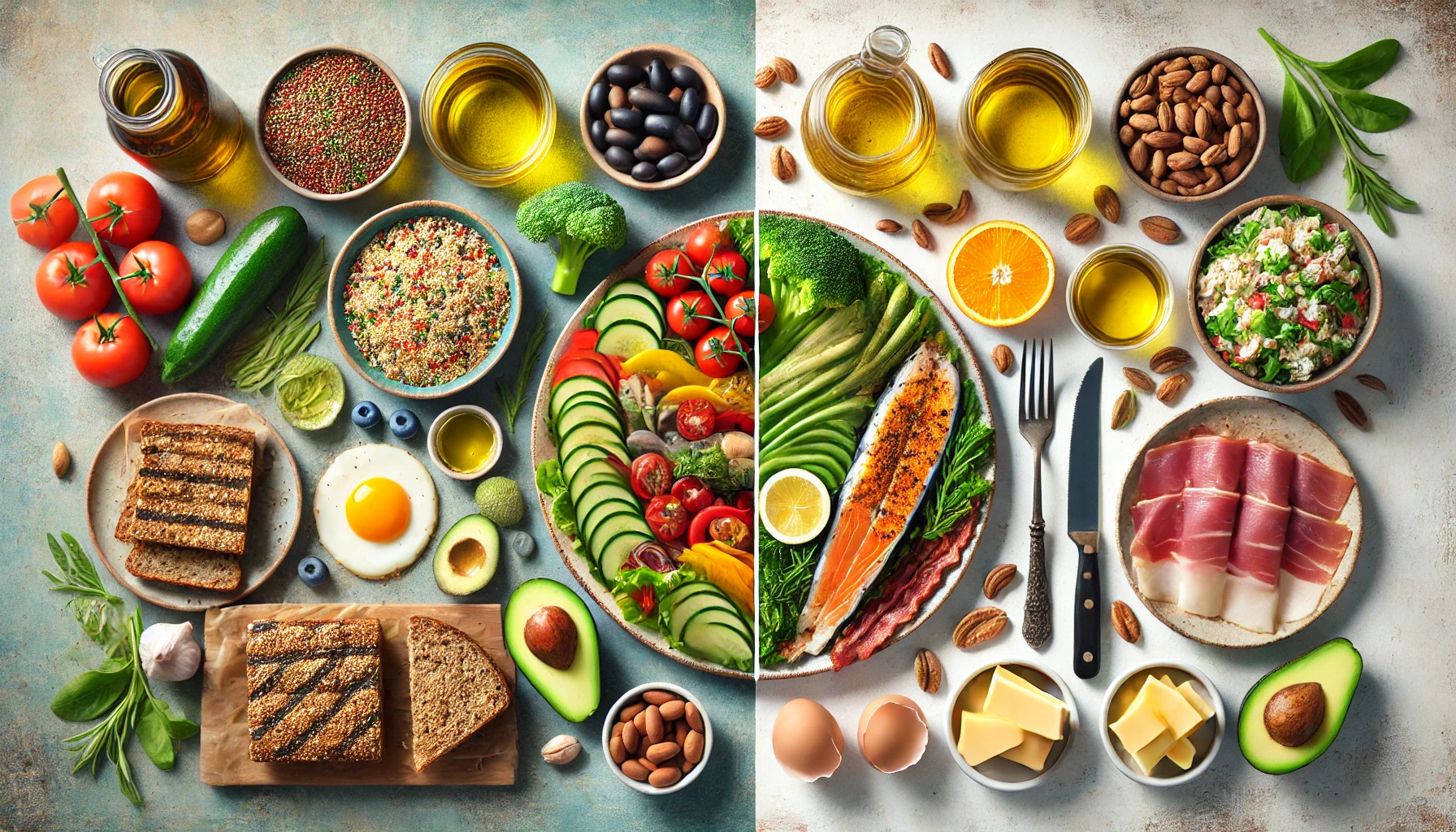
Flexibility vs. Rigidity
When comparing the Mediterranean Diet for weight loss to very low carbohydrate diets, flexibility emerges as a defining advantage. Very low-carb diets often require individuals to drastically reduce carbohydrate intake, sometimes as low as 20-50 grams per day. This extreme restriction can eliminate wholesome, nutrient-dense foods like fruits, legumes, and whole grains. These foods are rich in fiber, vitamins, and minerals, all of which are essential for a healthy diet.
In contrast, the Mediterranean Diet offers a more balanced and inclusive approach. It emphasizes whole, minimally processed foods, including moderate amounts of carbohydrates from sources like whole-grain bread, quinoa, and bulgur. For example, enjoying a slice of whole-grain bread drizzled with extra virgin olive oil is a common and encouraged part of this dietary pattern. This flexibility not only allows for a greater variety of foods but also accommodates personal preferences and cultural traditions, making the Mediterranean Diet more enjoyable and practical for long-term weight loss.
Sustainability and Adherence
Sustainability is a critical factor when evaluating any diet for weight loss. Very low-carb diets often produce rapid initial results but can be challenging to maintain. The monotony of limited food choices and the potential for cravings can lead to burnout, causing many individuals to abandon these diets after a short period.
The Mediterranean Diet for weight loss stands out for its emphasis on pleasure and moderation. Instead of banning foods, it encourages enjoying them in balanced portions. Pasta, bread, and even desserts can be part of the diet when paired with nutrient-dense foods like fresh vegetables, lean proteins, and healthy fats. This inclusive approach helps prevent feelings of deprivation, fostering a positive relationship with food. As a result, individuals are more likely to adhere to the Mediterranean Diet over the long term, which is essential for sustainable weight loss.
Impact on Health
While very low-carb diets can lead to quick weight loss due to reduced calorie intake and water loss, they may carry potential risks. Prolonged carbohydrate restriction can cause nutrient deficiencies, as it eliminates food groups that provide essential vitamins, minerals, and fiber. Additionally, some studies suggest that very low-carb diets may increase the risk of cardiovascular issues due to the overconsumption of saturated fats, often from animal-based foods.
In contrast, the Mediterranean Diet for weight loss prioritizes health alongside weight management. Rich in heart-healthy fats from olive oil, nuts, and fatty fish, this dietary pattern supports cardiovascular health. It also includes an abundance of antioxidant-rich fruits and vegetables, whole grains, and legumes, which collectively reduce inflammation and promote overall wellness. The Mediterranean Diet’s ability to improve metabolic health markers, such as cholesterol levels and blood pressure, further underscores its superiority as a sustainable weight-loss strategy that also enhances long-term health.
By emphasizing balance, sustainability, and overall health, the Mediterranean Diet for weight loss outshines very low carbohydrate diets as a practical and effective choice for those seeking lasting results.
The Takeaway
◼The Mediterranean Diet offers flexibility compared to restrictive low-carb diets, making it easier to stick with long-term.
◼Renowned for its heart-health benefits, this approach supports overall wellness while helping you shed pounds sustainably.
◼You don’t have to cut out carbs entirely—moderation is key, allowing you to enjoy balanced meals while achieving your weight loss goals.
Mediterranean Diet vs. Low-Calorie Diets

Quality vs. Quantity
When comparing the Mediterranean Diet for weight loss with low-calorie diets, the contrast lies in the focus on food quality versus mere calorie reduction. Low-calorie diets typically emphasize eating less, often ignoring the nutrient density of foods. This approach might lead to short-term weight loss, but it often leaves individuals feeling deprived and fatigued. In contrast, the Mediterranean Diet centers on the quality of food. It prioritizes nutrient-dense options like fresh vegetables, whole grains, lean proteins, and heart-healthy fats. For instance, a meal of grilled fish drizzled with olive oil, accompanied by a medley of roasted vegetables, delivers far more nourishment and satisfaction than a bowl of low-calorie, nutrient-deficient soup. This emphasis on whole, high-quality ingredients ensures that your body receives the vitamins, minerals, and energy it needs while still supporting weight loss goals.
Satiety and Energy
Another key advantage of the Mediterranean Diet for weight loss is its focus on foods that promote satiety and sustained energy levels. Staples of this diet, such as legumes, nuts, seeds, and olive oil, highlighted in the article The 7 Must-Have Staples for Weight Loss on the Mediterranean Diet’, are rich in monounsaturated fats and dietary fiber. These nutrients work synergistically to keep hunger at bay and prevent energy crashes. Studies show that a high-fiber diet, like the Mediterranean Diet, can influence hormones that regulate hunger, such as ghrelin and leptin. Research highlights that a high-fiber diet can lower post-meal ghrelin levels and reduce fasting leptin, which helps control appetite and increases feelings of fullness. This means you’re more likely to feel satisfied after meals and less likely to reach for unhealthy snacks. By providing steady energy from nutrient-rich foods, the Mediterranean Diet makes it easier to stay active and support long-term weight management.
Avoiding the Starvation Trap
One of the most significant pitfalls of low-calorie diets is their potential to trigger the “starvation trap.” Severe calorie restriction might result in rapid initial weight loss, but it also signals the body to conserve energy by slowing down metabolism. Over time, this can make further weight loss increasingly difficult and often leads to regaining the lost weight. The Mediterranean Diet for weight loss, however, avoids this common trap. By emphasizing balanced meals that are rich in essential nutrients, this diet supports metabolic health and prevents the body from entering a starvation mode. Instead of drastic calorie cutting, it promotes a sustainable calorie deficit through mindful eating of wholesome foods. This approach ensures that weight loss is gradual but long-lasting, with fewer risks of plateaus or rebound weight gain.
In summary, the Mediterranean Diet for weight loss offers a superior alternative to low-calorie diets by focusing on nutrient quality, enhancing satiety and energy, and steering clear of extreme calorie restrictions. By adopting this lifestyle, you’re not just losing weight—you’re nourishing your body for long-term health and well-being.
The Takeaway
◼The Mediterranean Diet emphasizes whole, nutrient-rich foods over empty, low-calorie options, ensuring your body gets essential vitamins and minerals while supporting weight loss.
◼Incorporating olive oil, nuts, seeds, and fiber-rich vegetables keeps you fuller longer, reducing the likelihood of overeating and promoting sustainable weight loss.
◼Maintaining a balanced, moderate calorie intake prevents metabolic slowdown, a common pitfall in restrictive diets. This ensures steady, long-term weight loss without compromising overall health or energy levels.
Mediterranean Diet vs. Intermittent Fasting

Flexibility of Meal Timing
One of the key advantages of the Mediterranean Diet for weight loss is its flexibility. Unlike intermittent fasting, which mandates specific eating and fasting windows, the Mediterranean Diet allows for a more adaptable approach to meal timing. Whether you prefer three structured meals per day, small snacks between meals, or an intermittent fasting schedule, this diet accommodates your personal preferences without compromising its core principles or effectiveness. This flexibility is particularly beneficial for those with busy schedules or varying daily routines, as it eliminates the stress of adhering to strict meal times. For individuals seeking sustainable weight loss, this adaptability ensures long-term adherence, a critical factor in achieving and maintaining results.
Mindful Eating vs. Fasting Windows
The Mediterranean Diet focuses on mindful eating, a practice that encourages savoring every bite and enjoying meals in the company of family or friends. This cultural emphasis on connection and enjoyment not only supports a positive relationship with food but also aids in weight loss by helping you recognize hunger and fullness cues. In contrast, intermittent fasting relies on designated eating and fasting periods, often leading to a rushed or overly strict approach to food consumption. While fasting windows can help some individuals reduce overall calorie intake, they may lack the holistic benefits associated with mindful eating. By prioritizing balanced meals full of nutrient-dense foods like fresh vegetables, lean proteins, whole grains, and healthy fats, the Mediterranean Diet naturally supports satiety, reducing the likelihood of overeating or binge eating.
Complementary Approaches
For those interested in maximizing weight loss, combining intermittent fasting with the Mediterranean Diet can be a powerful strategy. The nutrient-rich focus of the Mediterranean Diet ensures that when you do eat, your body receives the essential vitamins, minerals, and antioxidants it needs to function optimally. Intermittent fasting, on the other hand, may help regulate insulin sensitivity and promote fat metabolism. Together, these approaches create a synergistic effect, enhancing weight loss results while still emphasizing sustainable eating habits. For example, you can adopt a 16:8 fasting pattern while consuming Mediterranean-inspired meals during the eating window. Meals like a quinoa tabbouleh salad with olive oil, fresh herbs, and lean grilled fish provide a balanced combination of protein, healthy fats, and fiber, keeping you full and energized.
This combined approach also helps mitigate some challenges associated with intermittent fasting, such as the risk of nutrient deficiencies. The Mediterranean Diet’s emphasis on whole, unprocessed foods ensures that even within a reduced eating window, your meals remain balanced and satisfying. Additionally, incorporating mindful eating practices from the Mediterranean lifestyle into intermittent fasting routines can further enhance the experience, fostering a deeper connection with food and reducing emotional eating. By blending these complementary strategies, you can create a personalized plan that aligns with your lifestyle and weight loss goals.
In summary, while the Mediterranean Diet and intermittent fasting are effective weight loss methods individually, their combination can amplify benefits. The Mediterranean Diet’s flexibility and nutrient density provide a solid foundation for sustainable weight loss, whether followed alone or alongside an intermittent fasting regimen.
The Takeaway
◼The Mediterranean Diet allows flexible meal timing, making it adaptable to various lifestyles and individual preferences.
◼Its emphasis on mindful eating promotes a healthier relationship with food, reducing the likelihood of overeating or emotional eating.
◼Combining the Mediterranean diet with intermittent fasting can enhance weight loss results.
Building a Mediterranean Lifestyle for Weight Loss

Create a Mediterranean Pantry
A well-stocked pantry is essential when embracing the Mediterranean diet for weight loss. As outlined in the article Mediterranean Diet Shopping List: The Complete List to Fill Your Pantry for Success, focus on versatile staples such as extra-virgin olive oil, whole grains like quinoa or farro, and legumes like chickpeas and lentils. Fresh produce, including leafy greens, tomatoes, and cucumbers, should also be on your list. Add pantry-friendly options like canned sardines or tuna and a selection of dried herbs such as oregano and thyme. These ingredients form the foundation for Mediterranean-inspired meals, ensuring you always have the tools to create delicious and healthy dishes. With a Mediterranean pantry, meal preparation becomes more straightforward, making it easier to stay consistent in your weight-loss journey.
Make Mealtime Enjoyable
The Mediterranean lifestyle emphasizes the joy of eating, turning mealtimes into opportunities for connection and relaxation. This approach is vital for weight loss, as mindful eating fosters better portion control and satisfaction. Host a Mediterranean-themed dinner night to enjoy the vibrant flavors and share the experience with friends or family. Simple dishes like Greek salad bring vibrant flavors. Pair hummus with whole-grain pita for a wholesome snack. Grilled fish with roasted vegetables offers a delicious, balanced meal. Embracing the Mediterranean approach encourages savoring each bite, reducing the likelihood of overeating while enjoying nourishing foods.
Small Steps to Long-Term Habits
Adopting the Mediterranean diet for weight loss doesn’t require drastic changes. Begin with small, manageable steps, such as replacing one meal daily with a Mediterranean-inspired option. For instance, swap a sugary breakfast cereal for Greek yogurt topped with a drizzle of honey, a handful of nuts, and fresh fruit. Over time, these incremental changes create lasting habits, helping you integrate Mediterranean principles into your lifestyle effortlessly. These gradual shifts build a sustainable foundation for long-term weight-loss success.
The Takeaway
◼Stock your pantry with olive oil, whole grains, and legumes for quick, healthy Mediterranean Diet meals.
◼Sharing meals with loved ones boosts enjoyment and improves adherence to the Mediterranean Diet for weight management.
◼Make small, consistent changes like adding fresh vegetables and lean proteins to embrace the Mediterranean lifestyle.
Conclusion
The Mediterranean Diet for Weight Loss offers a proven, sustainable path to achieving your health goals. Unlike restrictive fad diets, this approach emphasizes nutrient-dense, flavorful foods and encourages long-term habits that support weight management and overall well-being. Rich in fruits, vegetables, whole grains, lean proteins, and healthy fats, the Mediterranean Diet for Weight Loss not only aids in shedding pounds but also promotes heart health, improved energy levels, and reduced inflammation.
Adopting the Mediterranean Diet for Weight Loss is more than a temporary fix—it’s a lifestyle transformation. By focusing on balance and moderation, this diet allows you to enjoy delicious meals without feeling deprived. The inclusion of diverse ingredients and recipes ensures variety, making it easier to stick to your goals. Whether you’re savoring a vibrant quinoa tabbouleh or drizzling olive oil over roasted vegetables, each choice contributes to a healthier, more sustainable way of eating.
Ready to take the first step? Begin by incorporating one Mediterranean-inspired meal into your day. Swap processed snacks for fresh fruit, or prepare a simple salad with olive oil and lemon. As you embrace these small changes, you’ll build momentum toward achieving your weight loss goals.
The Mediterranean Diet for Weight Loss is your key to looking, feeling, and living your best. Start today and experience the transformation that comes with nourishing your body and mind. It’s not just a diet—it’s a fulfilling, enjoyable lifestyle. Take the leap and invest in your health.
F.A.Q.
Yes, the Mediterranean Diet for Weight Loss helps you shed pounds naturally without stressing over calorie counting. It emphasizes whole, nutrient-dense foods like fruits, vegetables, whole grains, legumes, nuts, and olive oil. These foods are filling and lower in energy density, allowing you to eat satisfying portions while losing weight. The Mediterranean Diet encourages mindful eating, helping you enjoy meals slowly and recognize hunger cues. This approach helps avoid overeating and promotes a healthier relationship with food. By focusing on high-quality ingredients and healthy fats, it stabilizes blood sugar levels and reduces cravings. This diet supports fat loss naturally, making it a sustainable and effective weight management method.
Absolutely! The Mediterranean Diet for Weight Loss can be easily adapted for vegetarians and vegans. While traditional Mediterranean meals often include fish and lean meats, plant-based options fit seamlessly into the framework. Protein-rich legumes such as chickpeas, lentils, and black beans are excellent alternatives to animal proteins. Tofu, tempeh, and seitan can also be incorporated for variety. Vegetarians can enjoy Greek yogurt and feta cheese as dairy options. Vegans can use fortified plant milk or nutritional yeast. The Mediterranean Diet includes colorful vegetables, whole grains, and healthy fats like avocados and olive oil. These foods provide essential nutrients and make meals satisfying. Vegetarians and vegans can create balanced Mediterranean meals to support weight loss.
The Mediterranean Diet for Weight Loss delivers gradual, sustainable results while improving overall health. Results vary based on starting weight, activity level, and adherence. Many notice positive changes like reduced bloating and better digestion within weeks. Visible weight loss typically occurs after 4–6 weeks of consistency. The diet prioritizes unprocessed, nutrient-dense foods, ensuring steady fat loss while preserving muscle. Unlike fad diets, it avoids rebound weight gain and promotes lasting lifestyle changes. Its cardiovascular and anti-inflammatory benefits enhance well-being. This makes the weight loss journey enjoyable and sustainable for long-term success.

Nour is a registered dietitian, nutrition researcher, and founder of MedDietMindset. With a passion for evidence-based nutrition, she specializes in Mediterranean diet strategies, PCOS management, and sustainable weight loss. Nour is dedicated to transforming complex scientific research into clear, actionable guidance to support healthier, long-lasting lifestyle changes. Through her blog, she empowers readers to build habits that prioritize well-being, balance, and vitality.
